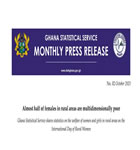
Related Press Release

Nationally, almost eight in every 10 (78.4%) females and seven in every 10 (72.1%) males aged 15-49 who have heard about HIV have discriminatory attitudes towards people living with HIV. Discriminatory attitudes is the inclination that children living with HIV should not attend school with children who are HIV negative or would not buy fresh vegetables from a shopkeeper who has HIV. The percentage with discriminatory attitudes is higher in rural areas (85.5% for females and 78.1% for males) compared to urban (73.4% for females and 67.3% of males). Among females aged 15 to 49 in eight regions – Ahafo (87.0%), Savannah (86.8%), Oti (86.4), North East (85.9%), Northern (85.7%), Upper West (83.8%), Western North (84.4%) and Upper East (80.1%) – over four in five have discriminatory attitudes towards people living with HIV. In comparison, three regions – North East (85.2%), Northern (83.1%) and Oti (81.5%) – have more than four in five males aged 15-49 with discriminatory attitudes towards people living with HIV. Persons with more education are less likely to show discriminatory attitudes towards people with HIV as the percentage of persons with discriminatory attitudes who have no education is more than twice that of persons with secondary education or more. Discriminatory attitudes among females aged 15-49 ranges from 91.5 percent for those with no education, decreases through primary (89.3%), secondary (78.9%) then more than secondary (44.8%). Across type of sex, discriminatory attitudes among males aged 15-49 with no education is 90.0 percent, compared to 86.8 percent for those with primary education, 73.6 percent for secondary education and 43.4 percent among those with secondary or more education. Discriminatory attitudes towards people with HIV decreases with wealth. It is highest among females aged 15-49 with the lowest wealth quintile (91.3%), followed by those in the second (88.1%), middle (83.3%), fourth (73.5%) and those in the highest quintile (63.7%), recording the lowest percentage. For males, 84.9 percent in the lowest quintile have the highest discriminatory attitudes towards people with HIV compared to those in the second (79.5%), middle (73.8%), fourth (71.3%) and the highest quintile (52.7%) The Ghana Statistical Service (GSS) released these statistics on International Zero Discriminatory Day on 1st March 2024 which is being commemorated under the theme “Save lives: Decriminalise”. The 2022 GDHS Report can be downloaded from https://statsghana.gov.gh/ and the microdata from https://statsghana.gov.gh/gssdatadownloadspage.php